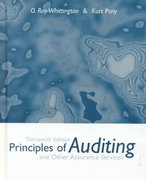You are a new staff assistant with the Houston office of a national public accounting firm. Yesterday
Question:
You are a new staff assistant with the Houston office of a national public accounting firm. Yesterday you read an article in The Wall Street Journal in which the managing partner of your firm's New York office discussed the problems caused for the public accounting profession by auditors underreporting the number of hours worked on audits.
You found this article interesting because of the experience you are having on the audit of Regal Industries, one of your office's largest clients. The fieldwork at Regal is being run by Mark Thomas, a very hardworking senior who is highly regarded within your office. Thomas made senior in record time, and has established a reputation for bringing jobs in on schedule. Four staff assistants, including yourself, are working under Thomas. At the end of the engagement, Thomas will write a performance report on each assistant, which will be placed in the assistant's personnel file. The manager on the engagement also writes a performance evaluation on each assistant and on Thomas. You have heard, however, that managers usually agree with whatever the senior has said about an assistant's performance.
The budgeted time estimates for almost every audit procedure being performed at Regal seem too short. No one is able to finish anything on schedule. Last week, Thomas approached all of the staff assistants about working Saturday to "catch up." He said that he was going to work a short day on Saturday and would not report the hours on his time sheet. He said that if you would do the same, he would buy lunch after you finished up on Saturday. You and two other assistants agreed. The fourth assistant, Dave Scott, declined, saying that he was going to a baseball game on Saturday.
The work on Saturday ran smoothly, and it was nice to wear jeans instead of dress clothes. You did quit a little early, although it was about 3:30, not noon. Afterwards, Thomas bought everyone lunch at a popular restaurant.
During the following workweek, you noticed that Thomas seemed quite friendly toward you and the other two assistants who had worked on Saturday. He also was complimentary of your work. He was not complimentary of Scott's work; in fact, you heard him comment to the engagement manager that he thought Scott would be a "short-timer," a phrase used to describe staff assistants who do not last long in public accounting. You were not too sympathetic to Scott's plight, however, as you and the other staff assistants also feel that Scott's work on the engagement has been substandard.
It is now Thursday afternoon, and Thomas has just asked the three of you who worked last Saturday if you will do the same thing again this week. He did not ask Scott. Again, Thomas offered to buy lunch if you would leave the hours off your time sheets. You suspect that Thomas has read the article in The Wall Street Journal, because he seemed a little defensive about asking you to underreport your time. He pointed out that you are not paid by the hour anyway, so leaving the extra hours off of your time sheet "doesn't really cost you anything."
Required:
a. Briefly explain why the managing partner of an office would probably oppose the practice of underreporting hours worked by the audit staff.
b. Briefly explain why a senior might not oppose the practice.
c. Explain how you think the other two staff assistants asked to work Saturday will probably respond. If you would respond differently, explain.
d. Suggest quality control procedures that you think could be implemented by a CPA firm to discourage the underreporting of time by audit staff members.
Step by Step Answer:

Principles Of Auditing And Other Assurance Services
ISBN: 9780072327267
13th Edition
Authors: Ray Whittington, Kurt Pany





